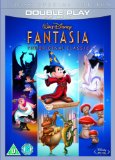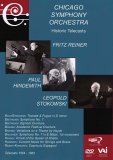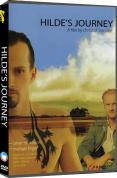![Fantasia - Platinum Edition [DVD] [1940]](/pictures/1106023.jpg) Fantasia - Platinum Edition | DVD | (28/03/2011)
from £6.98
| Saving you £-1.99 (N/A%)
| RRP
Fantasia - Platinum Edition | DVD | (28/03/2011)
from £6.98
| Saving you £-1.99 (N/A%)
| RRP Groundbreaking on several counts, not the least of which was an innovative use of animation and stereophonic sound, this ambitious Disney feature has lost nothing to time since its release in 1940. Classical music was interpreted by Disney animators, resulting in surreal fantasy and playful escapism. Leopold Stokowski and the Philadelphia Orchestra provided the music for eight segments by the composers Tchaikovsky, Moussorgsky, Stravinsky, Beethoven, Ponchielli, Bach, Dukas, and Schubert. Not all the sequences were created equally, but a few are simply glorious, such as "Night on Bald Mountain", "The Sorcerer's Apprentice", and "The Nutcracker Suite". The animation ranges from subtly delicate to fiercely bold. The screen bursts with color and action as creatures transmute and convention is thrust aside. The painstaking detail and saturated hues are unique to this film, unmatched even by more advanced technology. --Rochelle O'Gorman
![Fantasia - Platinum Edition [Blu-ray] [1940]](/pictures/1106020.jpg) Fantasia - Platinum Edition | Blu Ray | (31/10/2011)
from £7.99
| Saving you £N/A (N/A%)
| RRP
Fantasia - Platinum Edition | Blu Ray | (31/10/2011)
from £7.99
| Saving you £N/A (N/A%)
| RRP Groundbreaking on several counts, not the least of which was an innovative use of animation and stereophonic sound, this ambitious Disney feature has lost nothing to time since its release in 1940. Classical music was interpreted by Disney animators, resulting in surreal fantasy and playful escapism. Leopold Stokowski and the Philadelphia Orchestra provided the music for eight segments by the composers Tchaikovsky, Moussorgsky, Stravinsky, Beethoven, Ponchielli, Bach, Dukas, and Schubert. Not all the sequences were created equally, but a few are simply glorious, such as "Night on Bald Mountain", "The Sorcerer's Apprentice", and "The Nutcracker Suite". The animation ranges from subtly delicate to fiercely bold. The screen bursts with color and action as creatures transmute and convention is thrust aside. The painstaking detail and saturated hues are unique to this film, unmatched even by more advanced technology. --Rochelle O'Gorman
![Fantasia/Fantasia 2000 [Blu-ray]](/pictures/1104168.jpg) Fantasia/Fantasia 2000 | Blu Ray | (08/11/2010)
from £18.98
| Saving you £11.00 (64.74%)
| RRP
Fantasia/Fantasia 2000 | Blu Ray | (08/11/2010)
from £18.98
| Saving you £11.00 (64.74%)
| RRP FantasiaGroundbreaking on several counts, not the least of which was an innovative use of animation and stereophonic sound, this ambitious Disney feature has lost nothing to time since its release in 1940. Classical music was interpreted by Disney animators, resulting in surreal fantasy and playful escapism. Leopold Stokowski and the Philadelphia Orchestra provided the music for eight segments by the composers Tchaikovsky, Moussorgsky, Stravinsky, Beethoven, Ponchielli, Bach, Dukas and Schubert. Not all the sequences were created equally, but a few are simply glorious, such as "Night on Bald Mountain", "The Sorcerer's Apprentice" and "The Nutcracker Suite". The animation ranges from subtly delicate to fiercely bold. The screen bursts with colour and action as creatures transmute and convention is thrust aside. The painstaking detail and saturated hues are unique to this film, unmatched even by more advanced technology. --Rochelle O'GormanFantasia 2000More ambitious in scope than any of its other animated films (before or to come), Disney's 1940 feature Fantasia was a dizzying, magical and highly enjoyable marriage of classical music and animated images. Fantasia 2000, originally made for the IMAX large-screen format, features some breathtaking animation and storytelling, and in a few spots soars to wonderful high points, but it still more often than not has the feel of walking in its predecessor's footsteps as opposed to creating its own path. A family of whales swimming and soaring to Respighi's The Pines of Rome is magical to watch, but ends all too soon; a forest sprite's dance of life, death and rebirth to Stravinsky's The Rite of Spring too clearly echoes the original Fantasia's Night on Bald Mountain/Ave Maria sequence. But when it's on target, Fantasia 2000 is glorious enough to make you giddy. Hans Christian Andersen's "The Steadfast Tin Soldier" is a perfect narrative set to Shostakovich's Piano Concerto No. 2, and Donald Duck's guest appearance as the assistant to Noah (of the Ark fame) set to Elgar's Pomp and Circumstance marches is a welcome companion piece (though not an equal) to The Sorcerer's Apprentice, the one original Fantasia piece included here. The high point of Fantasia 2000, though, is a fantastic day-in-the-life sequence of 1930s New York City set to Gershwin's Rhapsody in Blue and animated in the style of cartoonist Al Hirschfeld; it's a perfect melding of music, story and animation style. --Mark Englehart
![Fantasia [1940]](/pictures/1010085.jpg) Fantasia | DVD | (27/11/2000)
from £19.95
| Saving you £0.04 (0.20%)
| RRP
Fantasia | DVD | (27/11/2000)
from £19.95
| Saving you £0.04 (0.20%)
| RRP Groundbreaking on several counts, not the least of which was an innovative use of animation and stereophonic sound, this ambitious Disney feature has lost nothing to time since its release in 1940. Classical music was interpreted by Disney animators, resulting in surreal fantasy and playful escapism. Leopold Stokowski and the Philadelphia Orchestra provided the music for eight segments by the composers Tchaikovsky, Moussorgsky, Stravinsky, Beethoven, Ponchielli, Bach, Dukas and Schubert. Not all the sequences were created equally, but a few are simply glorious, such as "Night on Bald Mountain", "The Sorcerer's Apprentice" and "The Nutcracker Suite". The animation ranges from subtly delicate to fiercely bold. The screen bursts with colour and action as creatures transmute and convention is thrust aside. The painstaking detail and saturated hues are unique to this film, unmatched even by more advanced technology. --Rochelle O'GormanFantasia and Fantasia 2000 are also available together in the 3-disc DVD Fantasia Collection.
![One Hundred Men And A Girl [1937]](/pictures/1012234.jpg) One Hundred Men And A Girl | DVD | (07/03/2011)
from £4.90
| Saving you £8.09 (165.10%)
| RRP
One Hundred Men And A Girl | DVD | (07/03/2011)
from £4.90
| Saving you £8.09 (165.10%)
| RRP The daughter of a struggling musician forms a symphony orchestra made up of his unemployed friends and leads them to a radio contract.
![Das Experiment [2002]](/pictures/1022436.jpg) Das Experiment | DVD | (21/04/2003)
from £5.00
| Saving you £10.99 (219.80%)
| RRP
Das Experiment | DVD | (21/04/2003)
from £5.00
| Saving you £10.99 (219.80%)
| RRP Inspired by a famous 1971 psychological experiment, Oliver Hirschbiegel's German-language movie Das Experiment finds a group of 20 volunteers randomly divided into 12 prisoners and eight guards and asked to play out their roles for a fortnight while scientists study their reactions. A conflict arises between undercover reporter Fahd (Moritz Bleibtreu), a con with a hidden agenda and the apparently mild-mannered Berus (Justus von Dohnanyi), a guard with a megalomaniac streak. The film begins as a psychological drama as ordinary people settle into the game, with joking displays of resistance by the "prisoners" greeted with increasing brutality from the "guards", but detours into suspense and horror as Fahd, who needs the experiment to get out of hand in order to make his story more saleable, deliberately ratchets up the tension between the factions only to see the situation spiral nightmarishly out of control as various test subjects in both camps edge closer to snapping. With a terrific display of ensemble acting and unforced use of the currently popular claustrophobic semi-documentary look, Hirschbiegel's movie takes its time to get underway, with apparently irrelevant cutaways to Fahd's outside girlfriend (Maren Eggert), but works up to a powerful second half that delivers a sustained symphony of psychological and physical anguish. On the DVD: Das Experiment on disc has an excellent-looking anamorphic widescreen transfer with English subtitles. The only extra feature is the trailer. --Kim Newman
 Fantasia (Blu-ray + DVD, with Blu-ray Packaging) | Blu Ray | (08/11/2010)
from £14.98
| Saving you £8.01 (53.47%)
| RRP
Fantasia (Blu-ray + DVD, with Blu-ray Packaging) | Blu Ray | (08/11/2010)
from £14.98
| Saving you £8.01 (53.47%)
| RRP Groundbreaking on several counts, not the least of which was an innovative use of animation and stereophonic sound, this ambitious Disney feature has lost nothing to time since its release in 1940. Classical music was interpreted by Disney animators, resulting in surreal fantasy and playful escapism. Leopold Stokowski and the Philadelphia Orchestra provided the music for eight segments by the composers Tchaikovsky, Moussorgsky, Stravinsky, Beethoven, Ponchielli, Bach, Dukas and Schubert. Not all the sequences were created equally, but a few are simply glorious, such as "Night on Bald Mountain", "The Sorcerer's Apprentice" and "The Nutcracker Suite". The animation ranges from subtly delicate to fiercely bold. The screen bursts with colour and action as creatures transmute and convention is thrust aside. The painstaking detail and saturated hues are unique to this film, unmatched even by more advanced technology. --Rochelle O'Gorman
![Das Experiment [DVD] [2001]](/pictures/1093034.jpg) Das Experiment | DVD | (04/05/2009)
from £7.82
| Saving you £-1.83 (N/A%)
| RRP
Das Experiment | DVD | (04/05/2009)
from £7.82
| Saving you £-1.83 (N/A%)
| RRP The Experiment is based on the infamous Stanford Prison Experiment conducted in 1971. A makeshift prison is set up in a research lab complete with cells bars and surveillance cameras. For two weeks 20 male participants are hired to play prisoners and guards. The 'prisoners' are locked up and have to follow seemingly mild rules and the 'guards' are told simply to retain order without using physical violence. Everybody is free to quit at any time thereby forfeiting payment. In the beginning the mood between both groups is insecure and rather emphatic. But soon quarrels arise and the wardens employ ever more drastic sanctions to confirm their authority.
 Fantasia (DVD + Blu-ray, with DVD Packaging) | Blu Ray | (08/11/2010)
from £9.18
| Saving you £13.81 (150.44%)
| RRP
Fantasia (DVD + Blu-ray, with DVD Packaging) | Blu Ray | (08/11/2010)
from £9.18
| Saving you £13.81 (150.44%)
| RRP Groundbreaking on several counts, not the least of which was an innovative use of animation and stereophonic sound, this ambitious Disney feature has lost nothing to time since its release in 1940. Classical music was interpreted by Disney animators, resulting in surreal fantasy and playful escapism. Leopold Stokowski and the Philadelphia Orchestra provided the music for eight segments by the composers Tchaikovsky, Moussorgsky, Stravinsky, Beethoven, Ponchielli, Bach, Dukas and Schubert. Not all the sequences were created equally, but a few are simply glorious, such as "Night on Bald Mountain", "The Sorcerer's Apprentice" and "The Nutcracker Suite". The animation ranges from subtly delicate to fiercely bold. The screen bursts with colour and action as creatures transmute and convention is thrust aside. The painstaking detail and saturated hues are unique to this film, unmatched even by more advanced technology. --Rochelle O'Gorman
 Regular Guys | DVD | (24/10/2005)
from £9.97
| Saving you £5.02 (33.50%)
| RRP
Regular Guys | DVD | (24/10/2005)
from £9.97
| Saving you £5.02 (33.50%)
| RRP Not your typical buddy movie Regular Guys is a refreshingly witty German comedy that takes a tongue-in-cheek peek at the complexities of relationships - gay straight and somewhere in-between. Christoph a macho cop goes on a bender after his fiance throws him out of the house. After waking in the arms of the very cute (and very naked!) Edgar a gay auto-mechanic Christoph's world is immediately changed. Did he - in a drunken haze - get it on with a man? If he did i
 Chicago Symphony Orchestra | DVD | (22/09/2003)
from £21.15
| Saving you £1.84 (8.00%)
| RRP
Chicago Symphony Orchestra | DVD | (22/09/2003)
from £21.15
| Saving you £1.84 (8.00%)
| RRP Track Listing:Beethoven: Symphony No. 7 in A major Op. 92Handel: Arrival of the Queen of Sheba from SolomonBeethoven: Egmont Overture Op. 84Chicago Symphony OrchestraFritz Reiner ConductorLive Telecast 1954Bach/Stokowski: Toccata & Fugue in D minorBrahms: Variations on a Theme by HaydnRimsky-Korsakov: Capriccio Espagnol Op. 34Chicago Symphony OrchestraLeopold Stokowski ConductorTelecast of January 3 1962Hindemith: Concert Music for Strings and Brass Op. 50Bruckner: Symphony No. 7 in E Major First MovementBrahms: Academic Festival Overture Op. 80Chicago Symphony OrchestraPaul Hindemith ConductorTelecast of April 7 1963
 Hilde's Journey | DVD | (22/05/2006)
from £8.07
| Saving you £9.92 (55.10%)
| RRP
Hilde's Journey | DVD | (22/05/2006)
from £8.07
| Saving you £9.92 (55.10%)
| RRP Carpenter Steff (Oliver Stokowski) is left the estate of his ex-boyfriend Martin Hilde son of a wealthy family along with instructions to scatter his ashes at sea. Instead Steff makes a deal with the family to receive a fraction of the inheritance in exchange for the ashes and no contest of the will. Steff needs the money to start up a business but Martin's last lover Rex refuses to let Steff betray Hilde's last wish and steals the urn. They head off on a journey both intend
![Nielsen - Stokowski Conducts Nielsen [1967]](/pictures/1089294.jpg) Nielsen - Stokowski Conducts Nielsen | DVD | (04/11/2008)
from £9.99
| Saving you £13.00 (130.13%)
| RRP
Nielsen - Stokowski Conducts Nielsen | DVD | (04/11/2008)
from £9.99
| Saving you £13.00 (130.13%)
| RRP ![Beethoven/Tchaikovsky/Stokowski - Symphony No. 7/Romeo... [1969]](/pictures/1077499.jpg) Beethoven/Tchaikovsky/Stokowski - Symphony No. 7/Romeo... | DVD | (02/08/2007)
from £16.98
| Saving you £6.01 (26.10%)
| RRP
Beethoven/Tchaikovsky/Stokowski - Symphony No. 7/Romeo... | DVD | (02/08/2007)
from £16.98
| Saving you £6.01 (26.10%)
| RRP 
Please wait. Loading...
This site uses cookies.
More details in our privacy policy